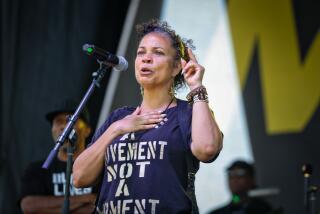Iraqi Everyman Faces Off With Hussein
- Share via
BAGHDAD — He appeared as a nondescript Iraqi everyman -- graying, beefy and bespectacled, and speaking in the earthy vernacular of his Tigris River valley farming town. But for several hours Monday, Ahmad Hassan Mohammed became a hero, facing off with Saddam Hussein.
Standing before a courtroom lectern, Mohammed gave a rambling account of the horrors that befell him, his family and neighbors in the Shiite Muslim town of Dujayl after a 1982 assassination attempt on then-President Hussein. At least twice he broke down and dabbed his eyes, recounting the detention and torture of himself as well as his brothers, sisters, mother and elderly father.
Hussein and other co-defendants and their lawyers repeatedly insulted, interrupted and questioned Mohammed, though they could not blunt the impact of the event: For the first time, one of Hussein’s alleged victims was able to confront the former dictator face to face in court, at a distance of perhaps seven feet.
Wearing a beige suit and a reddish shirt, Mohammed glared at the gallery of defendants, often frowning at the former president.
The 38-year-old Mohammed, who described himself as a simple laborer, directed contempt at such formerly fearsome figures as Hussein’s intelligence chief and half brother Barzan Ibrahim Hasan.
After Mohammed accused him of being culpable in the death of a 14-year-old Dujayl boy, Hasan muttered, “Go to hell.”
Mohammed responded without flinching, “You and your children go to hell.”
At times, Mohammed seemed to be bursting with rage, even raising his voice at Judge Rizgar Mohammed Amin when the jurist prevented him from repeating the fatiha, the opening verses of the Koran, traditionally used to commemorate the dead.
“When the defense lawyer was killed, they read the fatiha,” Mohammed protested, referring to one of two members of the defense team assassinated outside the courtroom. “So we need to read it for all the souls of the martyrs” of Dujayl, he said.
The normally unflappable judge appeared exasperated after a morning of defense antics, including Hussein chanting: “Long live Iraq. Long live the Arab nation.”
“Please,” the judge instructed the witness, “read us your complaint.”
But Mohammed was adamant. “I want to read the fatiha on their souls,” he said. “Are they criminals? A 14-year-old boy -- is he a criminal?”
The judge sighed. “Maintain order and say what you want to say within the lines of the law,” he said.
Mohammed’s testimony was filled with tearful moments, accusatory crescendos and punctuating silences.
He said he was 15 when the Iraqi security forces came for him and his family a day after the assassination attempt on Hussein. Authorities took him and his family to nightmarish prisons in Baghdad and Abu Ghraib before they were banished to the desert for years, he said.
“The mask they put on my face was falling because I was so little,” he said. He added, almost in passing, that he was beaten.
“They were torturing women in front of me,” he said. “It’s OK if they torture me or my brothers. But why do you take my mother and sisters?”
During cross-examination, defense attorneys hammered away at Mohammed’s credibility while sarcastically praising his performance.
“Why doesn’t he go into the cinema or TV?” Hasan said. “He has good acting skills.”
At several points, the lawyers appeared to succeed in pointing out that part of what Mohammed was saying was hearsay.
One of the lawyers asked him how he could have known that then-Vice President Taha Yassin Ramadan was in Dujayl’s Baath Party headquarters. “Did you see him?” a lawyer asked.
“Everyone knows he was there,” Mohammed replied.
Mohammed was also questioned about his assertion that Iraqi officials tore down Dujayl’s orchards. How, he was asked, could he have known this if he was in jail?
“I didn’t see them cut off the trees,” he conceded, “but all the people know this is a fact.”
Hussein called attention to Mohammed’s strong memory, suggesting he was trained. “This man memorizes everyone’s dates of birth,” he said. “This is staged.”
The former president repeatedly interrupted Mohammed’s delivery with sarcastic jibes that questioned his motives. When Mohammed noted that his sick mother, a Sunni Muslim, was taken in by the “good people of Ramadi” after years of banishment in a desert camp, Hussein interjected.
“You mean the Sunnis?” he asked, suggesting that Mohammed, a Shiite, was trying to score points by pointing out his ties to the rival sect. Hussein is also a Sunni.
But Mohammed was ready with a retort. “They are my uncles,” he said of the Sunni people of Ramadi, “and I honor them.”
In exchange after exchange, Mohammed came across as itching for a fight, wringing his hands as he waited for defendants to finish before moving in for quick lunges.
When Ramadan sarcastically referred to him as “this amazing witness” for the prosecution, Mohammed jabbed back.
“I’m amazing whether you like it or not,” he said.
When Hasan insisted he was still lawfully in charge of Iraqi intelligence, Mohammed replied coolly but scornfully.
“Good for you,” he said.
Times staff writer Saif Rasheed contributed to this report.
More to Read
Get the L.A. Times Politics newsletter
Deeply reported insights into legislation, politics and policy from Sacramento, Washington and beyond. In your inbox twice per week.
You may occasionally receive promotional content from the Los Angeles Times.







